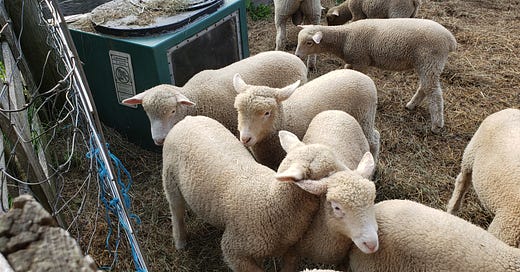Having been writing about the central importance of farming and food security for decades, I have noticed most people fall on one side or the other of the “food comprehension” line. Many emphatically agree that people have become dangerously dependent on unhealthy food; others scoff at small farms as a thing of the irrevocable past. To those who yawn at the proposal that small farms are vitally important to America’s future, I challenge you to read on and see if I sway your perspective a tad.
(2022 lamb flock).
For longer than living memory, small farmers have steadily disappeared from the American countryside. Modern technological advances, rising prices for real estate (and thus taxes), lower prices for agricultural products, and growing aversion to hard work pushed farming from the foreground of American life to a tiny remnant.
A century ago, Aldo Leopold stridently warned humanity of the imperative of soil and land stewardship. Wendell Berry later chronicled the destruction to rural communities emptied of farmers—local businesses such as grain and equipment dealers close, schools dwindle in enrollment; a downward spiral.
Accompanying the farmers were their animals, once dispersed widely throughout the countryside, now crowded into confinement operations, perhaps Chinese-owned. This has created food which is monetarily inexpensive, but exacts a huge cost on human, animal and environmental health.
Problems with Industrial Agriculture
Animal feed, as well as much human food, is largely dependent on monoculture crops of corn, soybean, and wheat. These crops in turn are largely GMO (Genetically Modified Organism) varieties which are genetically engineered to survive exposure to glyphosate (Round-up). Numerous other chemicals are employed to grow industrial food, as well as massive amounts of fossil fuels and fertilizers.
Conservatives must take the lead on environmental protection by supporting local and regenerative agriculture. Republicans desperately need a credible environmental policy. Richard Nixon led the nation in addressing chemical pollution. Al Gore misled the world into division over carbon dioxide. But Democrats and Republicans have always agreed that chemical pollution is a shared concern.
The chief area in which meaningful carbon dioxide reduction can be achieved is agriculture. (As an aside, this is not accomplished by reducing the number of cows, but by eliminating grains from their diets, and returning them to rotational outdoor grazing rather than permanent indoor housing). More carbon can be sequestered in the soil by improving regenerative agricultural methods and localizing food production than all the renewable energy programs combined can save.
Conservatives Must Provide Environmental Leadership
Conservatives need not believe in climate change alarms that the end of the world is nigh in order to see the reductions in chemical pollution, improvements to food quality, restoration of topsoils, economic growth, and reduced water usage that result from restoring farms widely to the countryside. For decades, government has undermined rural farms by directly and indirectly subsidizing consolidation and larger corporate stakeholders. There are incentives and regulatory relief that can favor small farms and start-ups.
In recent years, Americans have purchased more and more food internationally, including from China. Chinese interests have also acquired large ownership positions in many American food producers, and American farmland. With Taiwan in the balance, conflict with China over air balloons hints at the dangers of increasing dependence on faraway food. Then there are the globalists, and the World Economic Forum…..
Perhaps the greatest threat from industrial food production and distribution is not foreign but domestic. An extraordinarily large proportion of the produce Americans eat comes from a small region: California, Nevada and Arizona. This food is then transported huge distances, mostly using tractor trailer trucks. An interruption of this amazing yet vulnerable arrangement would be catastrophic.
Human Health and Local Food
Chemical exposures from food are increasing rates of cancer, obesity, diabetes, and high blood pressure in Americans; fouling reproductive health and lowering sperm counts. Supporting local farms benefits both rural and urban Americans with a more abundant source of fresh, local, chemical-free food.
The more that food is produced locally and regeneratively, the healthier the soil, water, and humans. Healthier too is the economy, which is more resistant to monetary inflation. This also improves national and local preparedness against economic, political, or technological interruption of food supplies, or international conflict.
Conservatives join many on the Left who embrace this long list of benefits from prioritizing local, healthy food production. Republicans need a responsive environmental policy, and small farms are it.
That’s how Americans must go about supporting a renewed Small Farm Republic.
(This is Tan-Tan, and her heifer (female) calf Cloudy. June 2022).







When I was a teenager contemplating the messages of the "hippies" of the 60s and 70s, I used to think to myself why does the "right" have such trouble with environmental and healthy food conversations? Finally, someone has laid it out pure and plain for all to see. Thank you, John.
I don't farm but I volunteer at a goat farm for a cheese maker. This is a great arrangement. She gets free help and I learn and get free cheese, eggs, and milk. She is super nice and always feeds me.